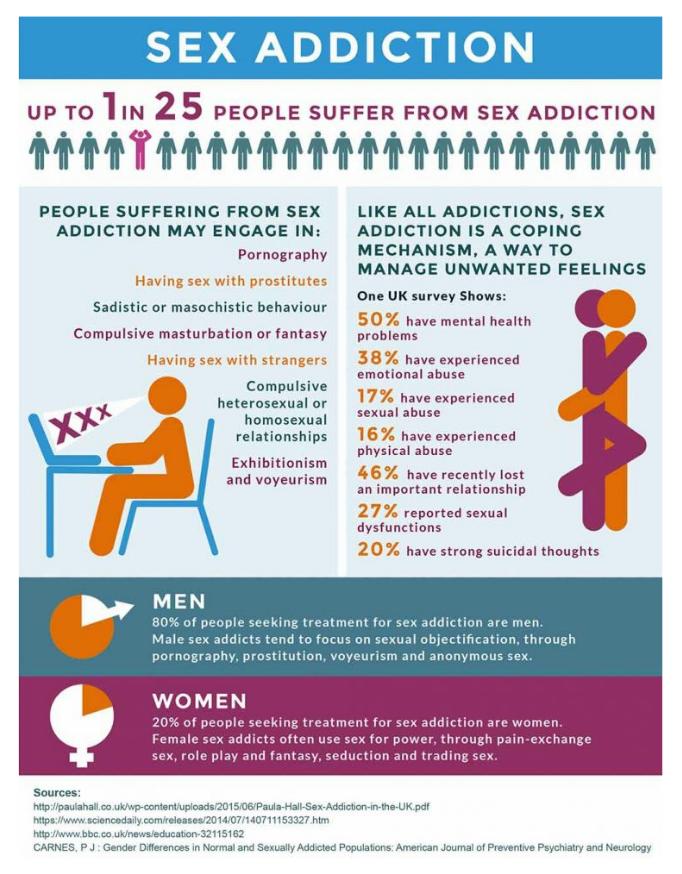Following the publication of my blog Masturbation http://blog.moniquecovet.eu/masturbation/, in October 2019, a lot of
people contacted me with questions about addiction to masturbation. Below I give a general overview of identifying the
problem and how to deal with it. I am a professional sex therapist and am very happy to answear any questions that may
arise from this blog
When masturbation becomes an addiction
Masturbation is not a problem in itself. When practised properly it is a sexual activity that offers great pleasure.
I love my vibrators and never want to give them up. For me and lots of women, using vibrators and masturbating
is part of a healthy and a happy sexual lifestyle. But there is a point when over dependence on masturbation and
internet porn can become a problem.
Masturbation addiction occurs with both sexes. The problem begins when we lose control over our desires and it
becomes unmanageable. It’s the point when we feel a compulsion to be satisfied but for some reason it’s not
enough. It can turn into a vicious circle where we need more and more. From a sexual act of happiness, we
become our own sex slaves. To feed the addiction we turn to external stimuli such as internet porn and sexual
images.
According to current statistics, this type of sexually based addiction occurs mainly in men but also affects a certain
percentage of women. It is primarily both a cultural and a biological problem.

Men’s bodies are less complicated than women’s bodies. A man can become aroused with an erotic photo, a sexy
neckline or the glimpse of a flashing stocking. In contrast, women need much more stimuli. Foreplay is all
important, the lead-up, the little touches, the suggestion, the timing, the teasing, the speed but only after the delay,
the mind games, the sex play, it might take five minutes or it might take five hours.
If you have a partner and you enjoy each other, keep enjoying it. If you need different partners be honest with
them and enjoy that too. Some people can satisfy their sexual instincts by watching porn movies. If that’s what
turns you on and makes you happy that’s ok too but remember there may be more out there, so keep an open mind.
The problem of addiction starts when you don't feel good in yourself anymore. Gradually you lose control. You
reach the point when you find yourself masturbating not because you enjoy what you are doing but because you
feel the need. That’s the definition of addiction.
Biochemistry triggers addictions. Orgasm releases dopamine (the hormone of happiness) to your brain. This
causes momentary euphoric feelings, but the more you do it the more you want to do. You gradually drop your
guard, it gets harder and harder to stop. The need takes over from the desire.
In many cases addiction is caused by psychological self-esteem problems such as anxiety and depression. The
good news is that if you stop fooling yourself that this is normal, if you finally admit to yourself that you have an
addiction, then almost all of these mind twisting problems can be remedied with appropriate therapy.
How therapy can help
It is very important that you openly discuss everything with your therapist. This may require talking to more than
one therapist until you find the right one for you. It will take more than one session but persevere and open
yourself. Remember a therapist is not there to judge you, all he or she wants to do is support you and guide you
back to normal healthy living.
You’ll be asked a lot of questions.
o When did it start? How did you feel in the beginning.? Were you happy? How has it changed?
o Did you do it secretly? Did you feel guilty? What made you turn to masturbation? Was there something
missing in your life?
o Did it make you happy in the beginning? What is different about it now compared to then?
o Have you talked openly about with your partner or partners about masturbation or do you find that difficult?
o Were you bored or maybe lonely in the beginning? Had you difficulties in your relationships? Were there
specific problems you had to battle with
o Had you lost confidence in yourself in some way, either personally or sexually?
o When did masturbation start controlling you or become an automatic part of your day? When did it start
controlling you instead of making you happy?
What you can do to help yourself
o Many people fall into the trap of masturbation addiction because they are lonely or afraid to build a
relationship. If that’s part of the problem you have to break out of your life pattern.
o Meet people in public. Remember that group sessions such as dancing or playing sports will create new
opportunities to meet people and start a relationship.
o Physical activities like going to the gym, swimming, cycling will promote endorphin, the pleasure hormone
naturally produced by the body.
o Doing social work to help others will give you a purpose in life and increase your self esteem.
o Live the good life, get enough sleep, eat healthy, never turn to drink or drugs, that only gives you false answers
to real problems.
o Set limits on how much internet porn you watch. Remember if you can set limits for your children you can do
it for yourself too.
o Curing a sex addiction is very different to overcoming a drink or drug addiction. Sexual urges are absolutely
normal human feelings. You don’t have to give up masturbating, you just have to limit it to a healthy norm.
o Put another way, it’s a lot to do with self control and making the hard decisions
Different stages of addiction
Addiction generally starts slowly abut can build to a frightening or dangerous stage.
1. If you are lucky enough to recognise and react to the early signs of addiction, it may be enough to gradually
masturbate less while following the advice above.
2. When the addiction is at an advanced stage, continuous withdrawal will not solve the problem. In this case you
seriously need the help of a professional therapist to guide you through psychotherapy and recognised treatment
techniques.
3. Treatments vary from one person to another just as attitudes vary about how much sex or masturbation is considered
normal among consenting adults. Some people are much more sexually liberated or repressed than others but
addiction is a serious medical problem which requires proper knowledge of the dangers involved.
4. It is up to the patient and their therapist to identify the scale of the problem and to work through the healthy resolution
of the issues.
5. Believe it or not recommended treatment can vary from practising moderation to overloading the system with more
masturbating than the body can handle.
6. The latter treatment, sometimes known as the Flooding Technique, instructs the addicted person to increase rather
than decrease the frequency of masturbation, to the point of overloading sexual stimuli to the brain. The individual is
asked to write down in detail how they feel before, during and after masturbation and analyse their feelings later. The
logic of this treatment is that the brain will eventually send signals to the body telling it that enough is enough, which
will in turn lead to the addict reducing the frequency of masturbation. While this treatment is medically recognised
and respected, it is essential that it is carried out under proper supervision of medical or clinical experts.
Curing any addiction is never easy. It calls for changes to be made, for finding strengths you may not even know you
have, it demands that hard decisions are made and implemented, it requires that you rediscover self-control and that
you look for and accept help as part of the healing process
But in the end it’s all worth it to get your life back to a healthier, happier, more beautiful place
Love and best wishes,
Monique

